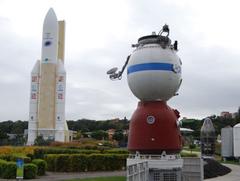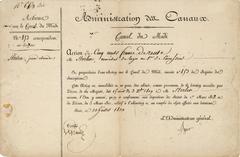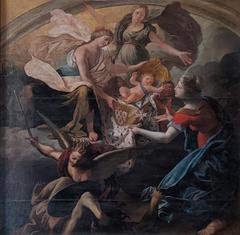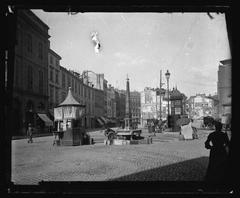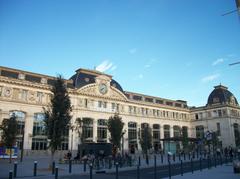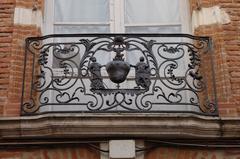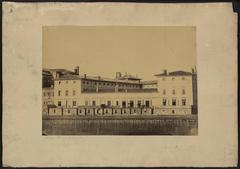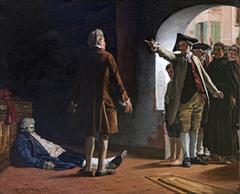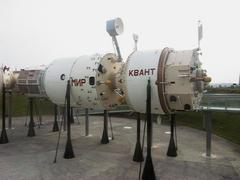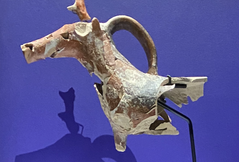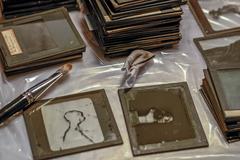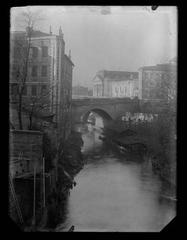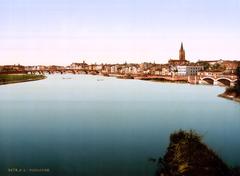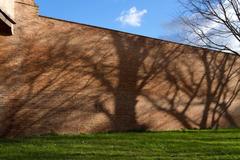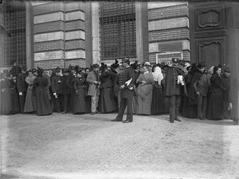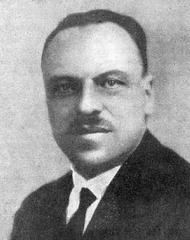Bellefontaine Toulouse, France: Visiting Hours, Tickets, and Historical Sites Guide
Date: 04/07/2025
Introduction: Bellefontaine and Its Place in Toulouse
Located in the southwest of Toulouse, Bellefontaine is a testament to the city’s evolution, from its ancient Roman roots to its modern multicultural identity. Toulouse, affectionately known as “La Ville Rose” for its iconic terracotta buildings, boasts over two thousand years of layered history. Bellefontaine, conceived as part of the ambitious Le Mirail urban project in the 1960s and 1970s, now reflects both the challenges and vibrancy of contemporary urban France. This guide unpacks Bellefontaine’s unique character, practical visitor information, and its connection to Toulouse’s renowned historical and cultural sites, ensuring you are well-equipped to explore with confidence and curiosity (Toulouse History: A Brief Overview; Springer: Le Mirail Analysis).
Contents
- Introduction: Bellefontaine and Its Place in Toulouse
- Ancient and Medieval Roots of Toulouse
- Key Monuments and Cultural Significance
- Bellefontaine: Historical Context and Urban Renewal
- Visitor Experience: Practical Tips and Accessibility
- Safety and Local Etiquette
- Frequently Asked Questions (FAQs)
- Summary and Resources
Ancient and Medieval Roots of Toulouse
Toulouse’s history stretches back to the 8th century BCE with the Volques Tectosages, and flourished as the Roman colony Tolosa from 106 BCE. Its strategic location fostered growth, evident in archaeological treasures at the Musée Saint-Raymond. Through the Middle Ages, Toulouse thrived as a center for the pastel (woad) trade, endured conflicts such as the Cathar Crusade, and rebounded from disasters like the Black Plague and the great fire of 1463, which cemented its signature pink-brick architecture (Toulouse History: A Brief Overview; Toulouse Tourism: History & Monuments).
Key Monuments and Cultural Significance
- Place du Capitole: The social and political heart of Toulouse, this grand square houses the Capitole building with its neoclassical façade. The square is open to the public; guided tours are available by appointment (Toulouse Tourism: Place du Capitole).
- Basilica of Saint-Sernin: A UNESCO World Heritage Site, this Romanesque church is open daily from 9:00 AM to 6:30 PM with free entry. It is a key stop on the Compostela pilgrimage (TravelSetu: Basilica of Saint-Sernin).
- Couvent des Jacobins: Open 10:00 AM–6:00 PM, €5 entry. Renowned for its Southern Gothic architecture.
- Canal du Midi: A scenic UNESCO-listed canal, perfect for leisurely walks and boat tours (TravelSetu: Canal du Midi).
- Museums: The Musée des Augustins (10:00 AM–6:00 PM, €6), and Les Abattoirs (11:00 AM–6:00 PM, €7) house fine and modern art collections (About-France: Museums).
Bellefontaine: Historical Context and Urban Renewal
Origins and Urban Planning
Bellefontaine emerged from the visionary Le Mirail project, developed to accommodate the needs of a growing city post-World War II. Designed by architects Georges Candilis, Shadrach Woods, and Alexis Josic, it features modular housing, interconnected pedestrian paths, green spaces, and a focus on community facilities (Springer: Le Mirail Analysis).
Urban Renewal and Community Transformation
Today, Bellefontaine is undergoing substantial urban renewal, spearheaded by the Toulouse Métropole. Efforts focus on:
- Renovating Housing: Upgrading energy efficiency and aesthetics.
- Expanding Green Spaces: Planting new trees and creating parks.
- Improving Mobility: Better public transport, cycling infrastructure, and pedestrian pathways.
- Fostering Community Engagement: Supporting local businesses and involving residents in planning (Toulouse Métropole; AToulouse).
Cultural and Social Fabric
Bellefontaine is renowned for its multicultural population, youthful demographic, and vibrant community life. Local markets, community centers, and cultural festivals celebrate a rich mix of traditions, languages, and cuisines (Wikipedia). Community facilities like the Maison de Quartier and Les Carrés de Bellefontaine serve as focal points for social programs and youth empowerment (ArchDaily).
Visitor Experience: Practical Tips and Accessibility
Getting There
- Metro: Bellefontaine is served by Toulouse Metro Line A (Bellefontaine station), connecting directly to the city center in about 15–20 minutes.
- Buses and Cycling: Several bus lines and cycling paths ensure easy access to and around the district (Toulouse Tourist Office).
Local Attractions and Experiences
- Parks and Green Spaces: Open from dawn to dusk, free of charge. Ideal for picnics, walks, and family outings (HikersBay).
- Local Markets: Experience fresh produce, spices, and multicultural foods, typically in the mornings (PlanetWare).
- Street Art and Community Events: Discover colorful murals and attend workshops, exhibitions, and annual multicultural festivals.
Accessibility
- Most public spaces and renovated buildings are wheelchair accessible.
- The metro station features elevators and modernized entrances (Toulouse Métropole).
Visiting Hours and Tickets
- Bellefontaine public spaces: Open from dawn to dusk.
- Community centers: 9:00 AM–7:00 PM, Monday to Saturday.
- Toulouse historical sites: Most open daily, with free or modestly-priced entry (typically €5–€7; see official sites for details).
- Toulouse City Card: Offers unlimited public transport and museum discounts (ThousandHotels).
Accommodation
A range of budget hotels and rentals is available, with convenient metro access. Choose accommodations near public transport and check reviews for comfort and safety (Tripadvisor).
Best Time to Visit
Spring (April–June) and early autumn (September–October) offer mild weather and fewer crowds (Best Time to Visit Toulouse).
Safety and Local Etiquette
Safety Considerations
- General: Toulouse is safe, but petty theft can occur in crowded places—keep valuables secure (TravelSafe-Abroad).
- Bellefontaine: Daytime visits are safe; exercise caution after dark and avoid poorly lit or isolated areas. Neighboring districts such as Bagatelle, Reynerie, and Les Izards also warrant caution at night (SmarterTravel).
- Emergency: Dial 112 for police, fire, or medical help.
Local Etiquette
- Greet shopkeepers and locals with “bonjour.”
- Dress modestly for markets and religious sites.
- Respect the multicultural community and maintain quiet in residential areas (TravelVagabonds).
Frequently Asked Questions (FAQs)
Q: What are Bellefontaine’s visiting hours?
A: Public spaces and parks are open dawn to dusk. Community centers operate 9:00 AM–7:00 PM, Monday to Saturday.
Q: Are there guided tours?
A: Official guided tours are rare, but local associations occasionally offer neighborhood walks. Check community center notice boards.
Q: Is Bellefontaine accessible for people with disabilities?
A: Yes, most public areas and modernized metro stations are wheelchair accessible.
Q: Is Bellefontaine safe?
A: Safe during the day; use standard urban caution at night.
Q: What is the best way to reach Bellefontaine from the airport?
A: Take public transit or a taxi; metro and bus routes provide direct access.
Q: Are there entrance fees for Bellefontaine’s parks and events?
A: No, public spaces and most community events are free.
Summary and Resources
Bellefontaine offers a window into Toulouse’s modern urban life, underscored by its multicultural community, evolving public spaces, and ongoing renewal. Its accessibility, lively markets, and proximity to Toulouse’s historic core make it a rewarding destination for visitors seeking both authenticity and convenience.
For a seamless visit, plan your trip during spring or autumn, use public transportation, and embrace the district’s cultural richness. Don’t miss Toulouse’s celebrated monuments, and take advantage of practical tools like the Toulouse City Card for seamless travel and museum access.
To stay informed about events and new attractions, download the Audiala app and follow Toulouse’s tourism channels.
Resources and Further Reading
- Toulouse History: A Brief Overview
- Toulouse Tourism: History & Monuments
- TravelSetu: Basilica of Saint-Sernin
- Springer: Le Mirail Analysis
- Toulouse Métropole Urban Renewal Report
- The Pink News: LGBTQ+ Travel in Toulouse
- AToulouse Urban Redesign
- ArchDaily: Les Carrés de Bellefontaine
- Wikipedia: Bellefontaine (Toulouse)
- La Dépêche: Bellefontaine commerce
- HikersBay: Toulouse Travel Information
- PlanetWare: Toulouse Attractions
- ThousandHotels: Things to Do in Toulouse
- Tripadvisor: Accommodation in Toulouse
- TravelVagabonds: Toulouse Packing List
- TravelSafe-Abroad: Toulouse Safety
- SmarterTravel: Toulouse Safety Tips
